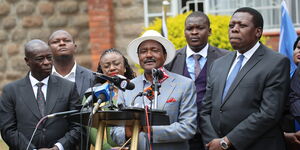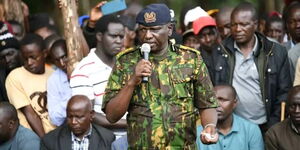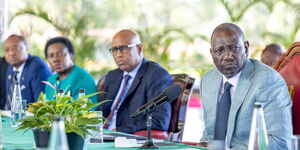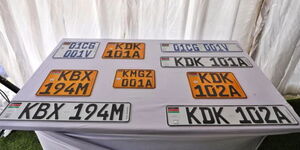Many Kenyans have learned and understand too well the critical role that Kenya's founding President Jomo Kenyatta plays in the country's history but very few people know his enablers' contribution.
One such enabler was former Cabinet Minister Bruce McKenzie who immigrated to Kenya as a farmer and ended up virtually running the entire administration.
McKenzie was born in 1919 in Richmond, in South Africa's Natal Province. He joined the South African Air Force in 1939 and was seconded during World War II to Britain's Royal Air Force, with which he saw action in North Africa, the Mediterranean and European theatres.
After sustaining an injury while flying a plane in the United Kingdom, he was treated and awarded a Distinguished Flying Cross (DFC) for his gallantry. Following his air force service, he emigrated to Kenya in 1946 and became a prominent farmer in Nakuru, and that is where his footsteps began.
Kenyan politician, spy, and first Agriculture Cabinet Minister Bruce McKenzie was a man whose third name was controversy. He was the only colonial minister that the new government of Mzee Jomo Kenyatta retained.
In an introduction to a memoir by Victoria Brittain, Bruce is portrayed as among the first Europeans who read the wind of change and sided with African nationalists.
Crafty, opportunistic and manipulative, he first befriended Mboya, and then shifted his allegiance to the “Gatundu Group”.
It was in such a way that he found himself going to the Lancaster House Conference alongside James Gichuru, Tom Mboya, and a few others.
There he was haunted by accusations that the trip was a front to get exotic dancers to come and entertain revellers at his club in Nairobi. He had owned that club long before the country got its independence.
Nation Media reported that being the kind of man he was, he had made many friends and many enemies in the course of his life. He had friends in people like Jomo Kenyatta, Daniel Moi, Mwai Kibaki (Who later purchased his Gingalili Farm in Solai) and Julius Biwott in Kenya and even more highly placed sources abroad.
It is also stated that being the chairman of Coopers Motor Corporation (CMC), Bruce brought Charles Njonjo into the league of billionaires, further strengthening his vice-like grip on key government sectors.
Nation Media asserted that in 1968, when Britain and Israel were engaged in rivalry over Kenya’s security contracts, he secretly invited the Israelis to help train the General Service Unit, before turning around to warn the British Commonwealth Secretary that the Jewish country was trying to penetrate Kenya’s military and should be stopped.
In spite of all the drama surrounding his life, Mckenzie was a hard man to kill. An RAF pilot during the Second World War, he had been shot down twice, the second time over the Mediterranean where he had drifted for two days with most of his face blown away.
The beginning of his end was to come after another engagement with the Israeli government in July 1976.
This was after an Air France plane was hijacked at Entebbe by a Palestinian splinter group of the Popular Front for the Liberation of Palestine (PFLP) and two German revolutionaries demanding the release of 40 Palestinian prisoners in Israel and 13 in four other countries.
Bruce MacKenzie is said to have persuaded the Kenyan president, Jomo Kenyatta, to allow the Mossad (Israel's Intelligence Agency) to gather intelligence before the operation and permit the Israeli Air force access to Jomo Kenyatta International Airport.
In the resultant raid, forty-five Ugandan soldiers and three hostages were killed and 30 planes of the Ugandan air force destroyed by the Israeli rescue raid.
Former Cabinet minister Bruce McKenzie, according to American intelligence briefing, had made a great number of enemies due to allegedly heavy-handed and dirty business tactics, and Idi Amin, once an ally, was added to the list.
The sunset on Bruce McKenzie came after his twin-engine Piper Aztec 23 plane exploded over Ngong Hills, a few minutes past 6 pm on May 25, 1978, as he flew back from a meeting with President Idi Amin of Uganda.
A bomb, it was reported, had been placed in a present from Idi Amin of Uganda as payback for Mackenzie’s role in Kenya’s assistance to the Israelis’ ending of the 1976 Entebbe hostage crisis.
However, a confidential report compiled by the East African Research Department of Foreign and Commonwealth Office said it was the work of the Criminal Investigations Department on behalf of influential people in Kenya.
It is rumoured that at the time of his death, he was a director of more than 20 Kenyan firms and had business interests in Canada, Saudi Arabia, the US, and Brazil.
Bruce came into the Kenyan political scene with a bang, lived a life rife with controversy and anarchy, and just as he lived, he left, the steps of his existence coming to an abrupt halt at the foot of his grave.












